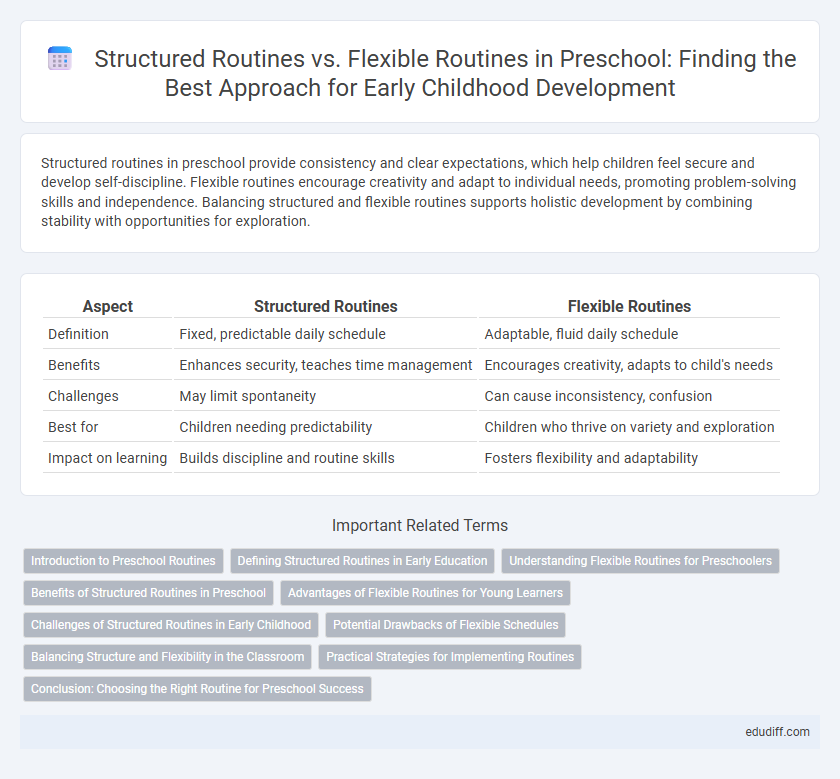Structured routines in preschool provide consistency and clear expectations, which help children feel secure and develop self-discipline. Flexible routines encourage creativity and adapt to individual needs, promoting problem-solving skills and independence. Balancing structured and flexible routines supports holistic development by combining stability with opportunities for exploration.
Table of Comparison
| Aspect | Structured Routines | Flexible Routines |
|---|---|---|
| Definition | Fixed, predictable daily schedule | Adaptable, fluid daily schedule |
| Benefits | Enhances security, teaches time management | Encourages creativity, adapts to child's needs |
| Challenges | May limit spontaneity | Can cause inconsistency, confusion |
| Best for | Children needing predictability | Children who thrive on variety and exploration |
| Impact on learning | Builds discipline and routine skills | Fosters flexibility and adaptability |
Introduction to Preschool Routines
Structured preschool routines provide young children with clear expectations and consistent transitions, which support cognitive development and emotional security. Flexible routines, on the other hand, allow for adaptability to individual children's needs and promote creativity and problem-solving skills. Balancing structured guidelines with flexibility enhances early learning environments by fostering both discipline and independence.
Defining Structured Routines in Early Education
Structured routines in early education refer to consistent, predictable schedules that guide preschool activities, promoting security and enabling children to anticipate transitions. These routines support cognitive and social development by fostering a stable environment where children can learn time management and self-discipline. Implementing structured routines aids educators in creating a balanced curriculum that meets developmental milestones efficiently.
Understanding Flexible Routines for Preschoolers
Flexible routines in preschool accommodate children's varying needs and promote adaptability by allowing adjustments based on individual responses and interests. Unlike rigid schedules, flexible routines support emotional regulation, creativity, and independence by offering predictable yet modifiable frameworks for daily activities. This approach enhances cognitive development and social skills by fostering a secure environment where preschoolers feel empowered to explore and learn at their own pace.
Benefits of Structured Routines in Preschool
Structured routines in preschool foster a predictable environment that enhances children's sense of security and reduces anxiety, supporting emotional development. Consistent schedules improve time management skills and facilitate smoother transitions between activities, which promotes positive behavior and focus. These routines also enable educators to systematically integrate learning objectives, maximizing cognitive growth and skill acquisition.
Advantages of Flexible Routines for Young Learners
Flexible routines in preschools foster adaptability and creativity in young learners by allowing spontaneous exploration and individualized pacing. Such routines accommodate diverse learning styles and developmental needs, promoting emotional resilience and intrinsic motivation. This approach enhances social skills and problem-solving abilities by encouraging collaboration and decision-making in dynamic settings.
Challenges of Structured Routines in Early Childhood
Structured routines in early childhood settings can challenge preschoolers by limiting opportunities for creativity and spontaneous play, which are essential for cognitive and social development. These rigid schedules often reduce children's ability to explore interests at their own pace, leading to potential frustration and decreased motivation. Furthermore, overly strict routines may hinder adaptability and problem-solving skills, crucial for early learning success.
Potential Drawbacks of Flexible Schedules
Flexible routines in preschools can lead to inconsistent learning experiences, making it harder for children to develop a stable sense of time and expectations. Lack of structure may cause difficulties in behavior management and reduce opportunities for skill reinforcement. This unpredictability can increase stress for both teachers and young learners, potentially hindering cognitive and social development.
Balancing Structure and Flexibility in the Classroom
Balancing structure and flexibility in the preschool classroom enhances children's social-emotional development and cognitive growth. Structured routines provide predictability and security, supporting executive function skills, while flexible routines encourage creativity, problem-solving, and adaptability. Integrating consistent schedules with opportunities for spontaneous play fosters a dynamic learning environment that meets diverse developmental needs.
Practical Strategies for Implementing Routines
Structured routines in preschool create consistency by setting specific times for activities, aiding children's time management and fostering a sense of security. Flexible routines allow adaptation based on children's needs and interests, promoting engagement and creativity. Practical strategies include balancing fixed activity times with open-ended play periods and using visual schedules to guide transitions while accommodating individual differences.
Conclusion: Choosing the Right Routine for Preschool Success
Structured routines in preschool provide consistency and clear expectations, fostering a secure learning environment that supports cognitive and social development. Flexible routines encourage adaptability and creativity, allowing children to explore and respond to individual needs and interests. Balancing structured and flexible approaches optimizes preschool success by promoting both stability and personalized growth.
Structured routines vs Flexible routines Infographic

 edudiff.com
edudiff.com